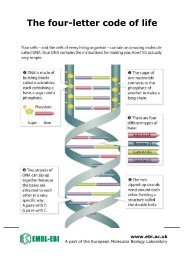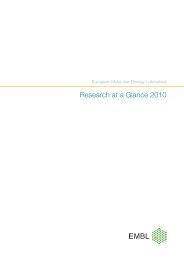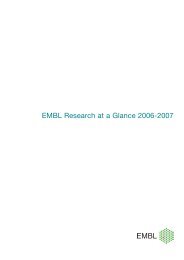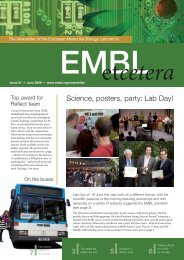Create successful ePaper yourself
Turn your PDF publications into a flip-book with our unique Google optimized e-Paper software.
<strong>EMBL</strong>-EBI<br />
The Proteomics Services Team<br />
Previous and current research<br />
The Proteomics Services team develops tools and resources for the representation, deposition,<br />
distribution and analysis of proteomics and proteomics-related data. The team is a major contributor<br />
to the Proteomics Standards Initiative (PSI; www.psidev.info) of the international Human<br />
Proteome Organization (HUPO). We provide reference implementations for the PSI community<br />
standards, in particular the PRIDE protein identification database (www.ebi.ac.uk/pride) and the<br />
IntAct molecular interaction database (www.ebi.ac.uk/intact). On the next level of abstraction, we<br />
provide the Reactome database of pathways (www.reactome.org) in collaboration with Cold Spring<br />
Harbor Laboratory, New York.<br />
As a result of long-term engagement with the proteomics community, journal editors and funding<br />
organisations, proteomics data deposition in PSI-compliant data resources such as IntAct and<br />
PRIDE is increasingly becoming a strongly recommended part of the publishing process. Accordingly,<br />
this has resulted in a rapid increase in the data content of our resources.<br />
The Proteomics curation teams ensure consistency and appropriate annotation of all data; whether<br />
from direct depositions or literature curation, to provide the community with high-quality reference<br />
datasets.<br />
Across a range of European projects (Apo-Sys, BioSapiens, FELICS, ENFIN, ProteomeBinders and<br />
Transfog) we contribute to the development of data integration technologies using the Distributed<br />
Annotation System (DAS) and web services. In particular, the successful Ontology Lookup Service (OLS; www.ebi.ac.uk/ols), Protein<br />
Identifier Cross-Reference Service (PICR; www.ebi.ac.uk/Tools/picr) and the DASTY DAS client (www.ebi.ac.uk/dasty) are under constant<br />
evolution and development.<br />
The Proteomics Services team follows an open source, open data approach; all resources<br />
we develop are freely available.<br />
Henning<br />
Hermjakob<br />
Dipl. Inf (MSc) 1996,<br />
Bioinformatics, University of<br />
Bielefeld.<br />
Research assistant at the<br />
National Research Centre for<br />
Biotechnology (GBF),<br />
Braunschweig, Germany, in<br />
the Transfac Database team.<br />
Team leader at <strong>EMBL</strong>-EBI<br />
since 2005.<br />
Future project and goals<br />
In 2007, our molecular interaction activities resulted in a substantial set of published<br />
manuscripts, from the MIMIx guidelines via the PSI MI 2.5 format to the standard<br />
implementation in the IntAct database. In 2008, a similar breakthrough has been<br />
achieved in the domain of protein identifications, with three published MIAPE modules<br />
and the release of the mzML format for mass spectrometry data representation.<br />
For 2009, we plan to build on these standards and their implementation in PRIDE<br />
and IntAct, and initiate a regular exchange of proteomics data with international<br />
collaborators in the ProteomExchange and IMEx consortia (http://imex.sf.net).<br />
We also plan to intensify data integration within and beyond the projects of the Proteomics<br />
Services team, in particular in the context of the EnVision platform. We<br />
also hope to achieve this in the context of closer integration between IntAct and Reactome,<br />
supplementing canonical pathway information with relevant molecular interaction<br />
data.<br />
Finally, we will continue our successful collaboration with all PSI partners, in particular<br />
with journals and editors, to encourage data producers to make their data<br />
available to the community through public databases by utilising community-supported<br />
standards.<br />
PRIDE detail view for a submitted spectrum, including<br />
annotation of submitted fragment ions in the spectrum.<br />
Selected references<br />
Klie, S. et al. (2008). Analyzing large-scale proteomics projects with<br />
latent semantic indexing. Journal of Proteome Research, 7, 182-191<br />
Martens, L., Palazzi, L.M. & Hermjakob, H. (2008). Data standards<br />
and controlled vocabularies for proteomics. Methods Mol. Biol., 8,<br />
279-286<br />
Michaut, M. et al. (2008). InteroPORC: Automated inference of highly<br />
conserved protein interaction networks. Bioinformatics, 2, 1625-<br />
1631<br />
Montecchi-Palazzi, L. et al. (2008). The PSI-MOD community<br />
standard for representation of protein modification data. Nat.<br />
Biotechnol., 26, 86-866<br />
Mueller, M. et al. (2008). Analysis of the experimental detection of<br />
central nervous system-related genes in human brain and<br />
cerebrospinal fluid datasets. Proteomics, 8, 1138-118<br />
77













